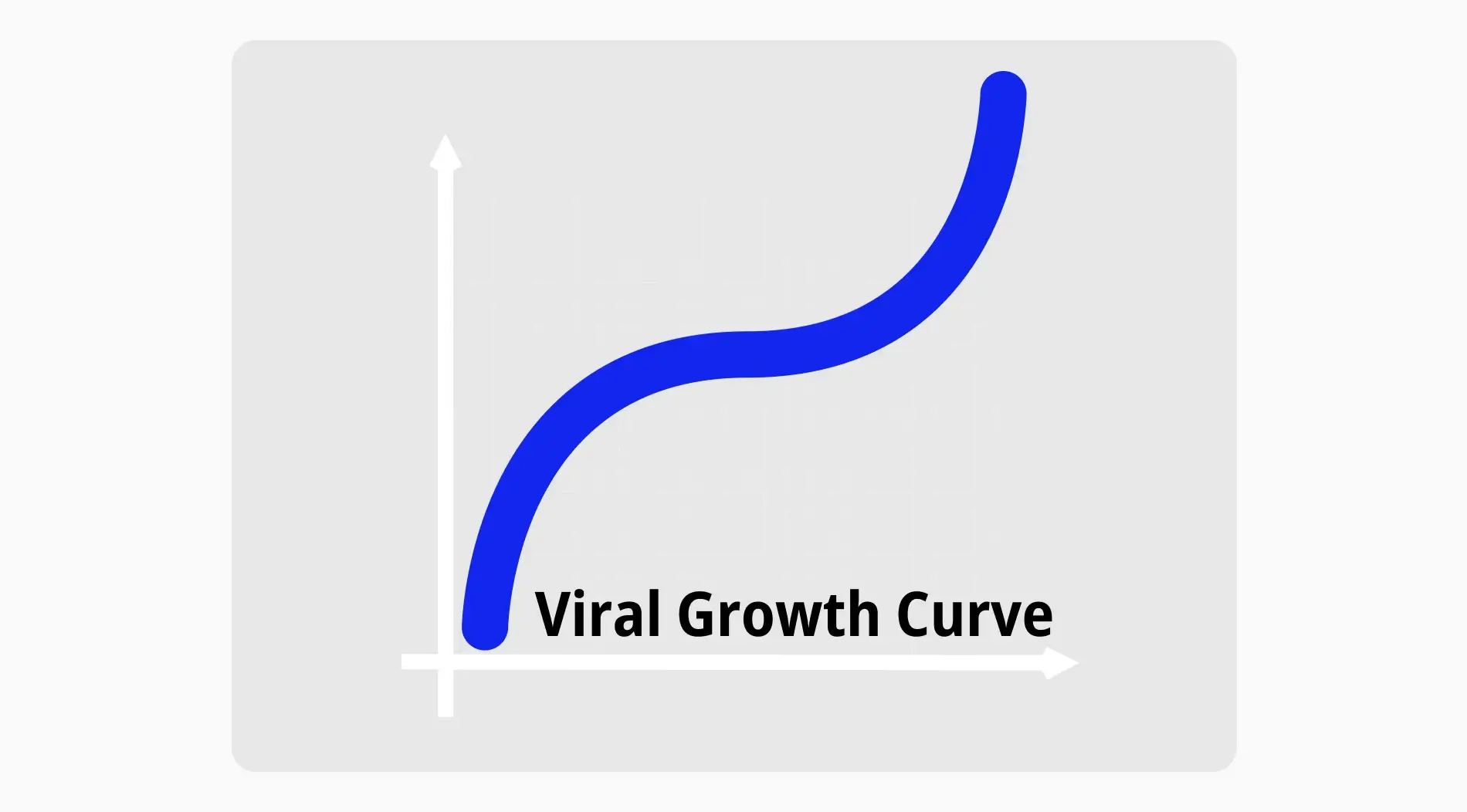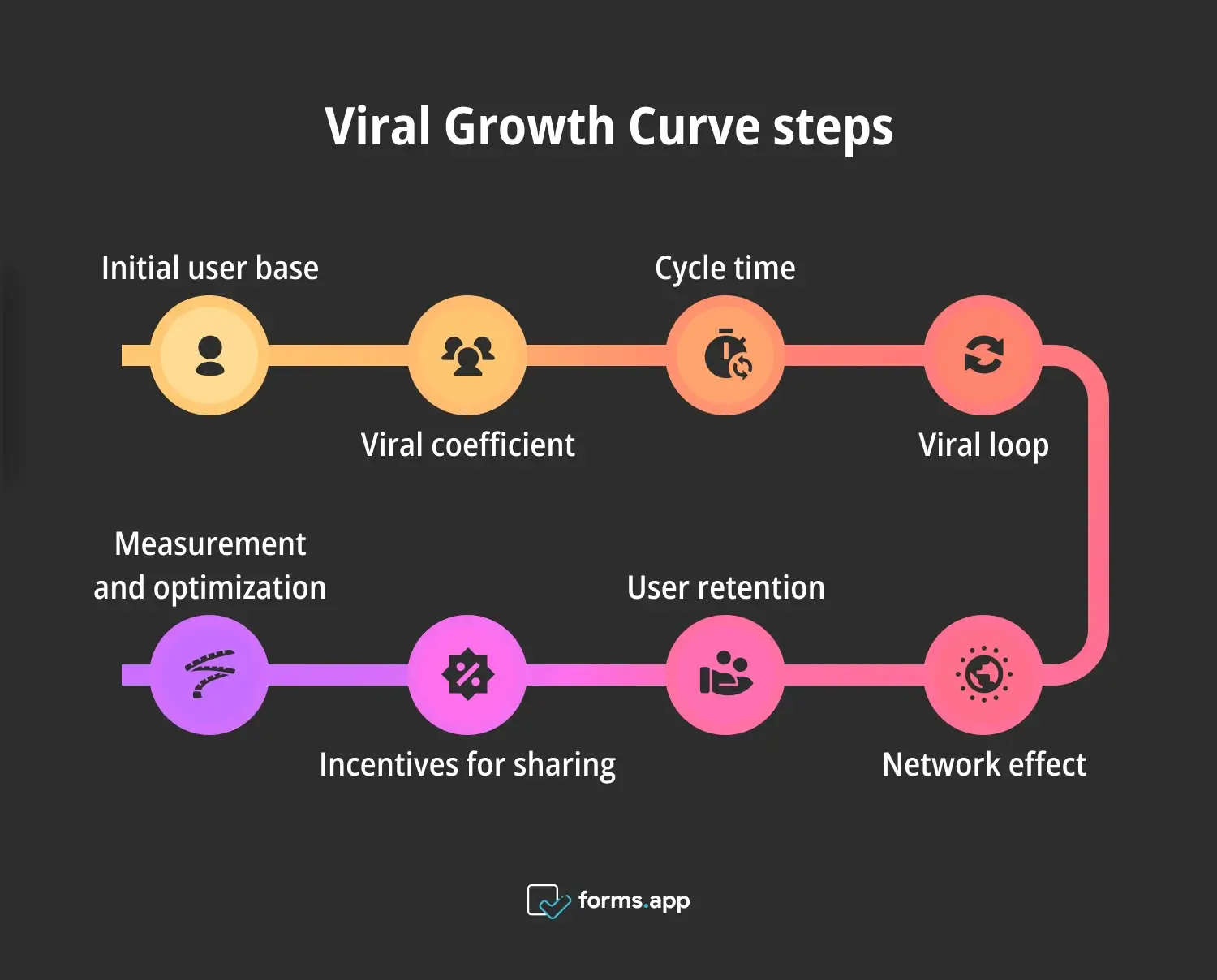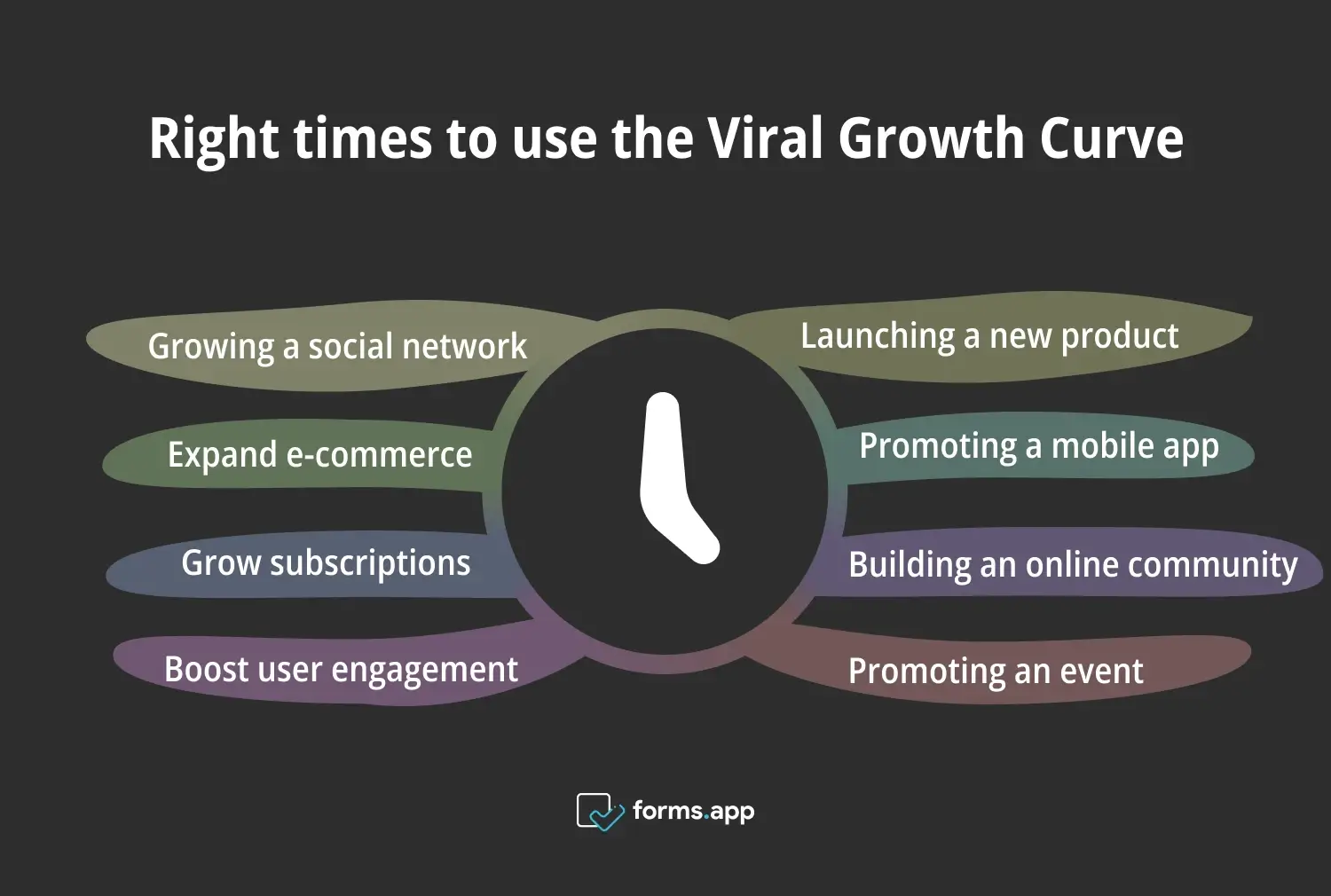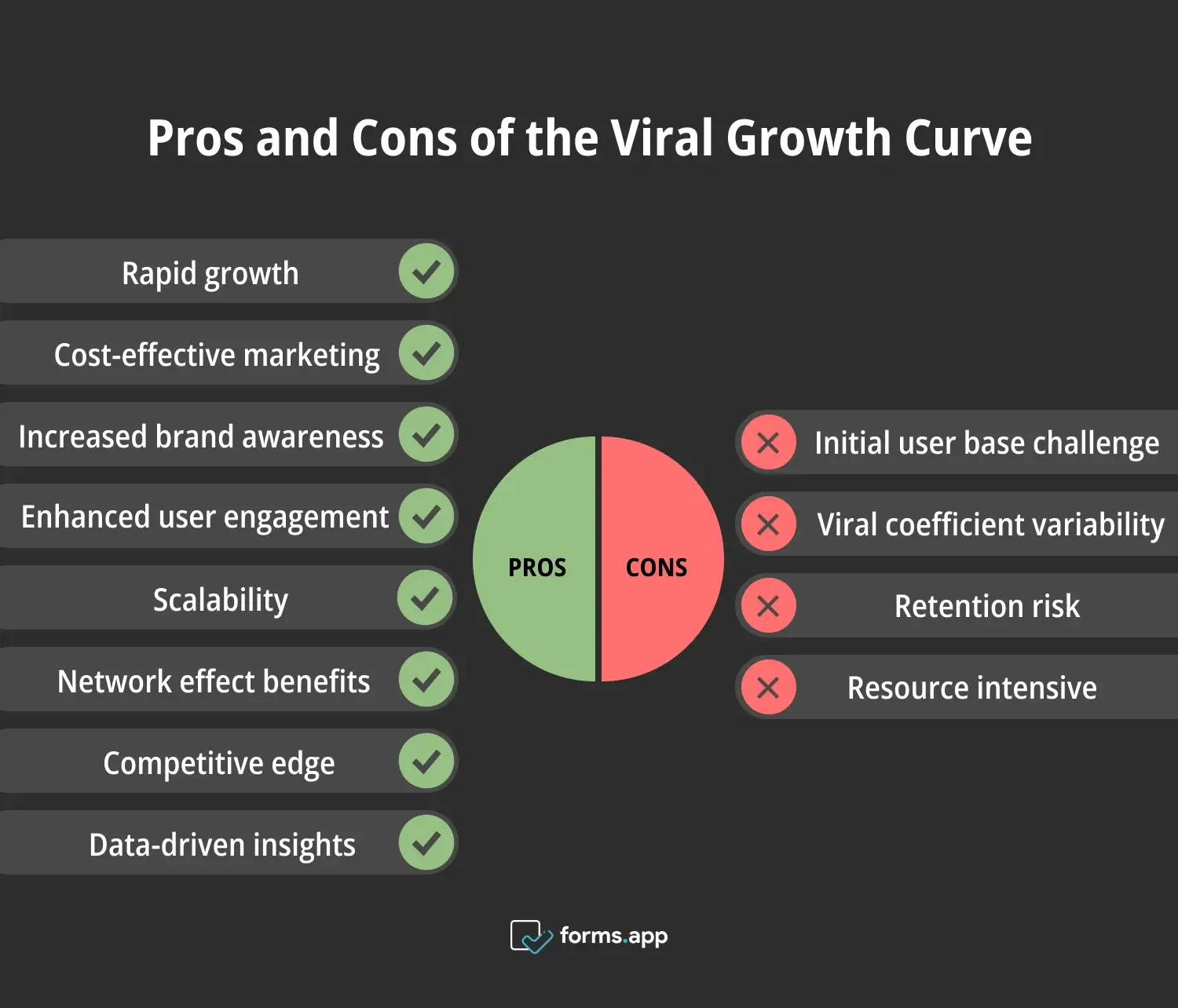
There are incredibly powerful tools for businesses that want to achieve rapid and sustained growth. By using these tools, you can transform your marketing strategies and see exponential increases in customer acquisition and engagement. In today’s highly competitive market, mastering these models is essential for staying ahead of your competitors and sustaining your leadership in your industry.
Today, we will explore one of these tools, the viral growth curve and its immense potential for boosting your business. We will witness its importance and provide a detailed explanation of its various components. You will also learn a step-by-step approach to using this tool effectively and see real-life examples. By the end, you will also understand its advantages and disadvantages.
What is the viral growth model curve in business?

The viral growth curve is a graphical representation that shows the exponential increase in a product or service's user or customer base when it goes viral, influenced by the speed of the spread of viruses in a biological sense.
Similar to biology, this curve illustrates how quickly a user base can grow after achieving the initial spark of virality. By understanding this curve, you can predict and manage rapid growth phases more effectively for your business. This allows for better strategic planning and resource allocation.
The viral growth curve is a steep upward trajectory that follows an initial slow start. This momentum occurs when each user invites multiple new users, creating a multiplying effect. The faster the user base grows, the steeper the curve becomes. This reflects the exponential nature of viral growth.
By analyzing the viral growth curve, your business can identify critical points where to maximize the growth. This highlights understanding the importance of the viral growth curve. The factors may include the ease of sharing, the inherent appeal of the product or service, and the effectiveness of incentives offered for sharing.
Leveraging viral dynamics of biology in business growth
Understanding viral infections is very important when it comes to the dynamics of leveraging the viral growth curve in business strategy. Just as the virus can be detected in the infected cells, your business should also identify opportunities for rapid growth through effective detection and target potential customer bases.
The phases
Firstly, the attachment phase involves engaging with the audience, penetrating their interests, and uncoating their needs through compelling content and product offerings.
Biosynthesis and maturation occur as customer engagement deepens and spreads, leading to viral release, where satisfied customers become advocates. This biological lifecycle is the same as the strategic implementation of viral growth strategies.
It also ensures that your business can navigate complexities, such as understanding market receptors and entering customer circles effectively. This is very similar to the receptors animal viruses enter in terms of virology. The life cycle of viruses with animal hosts is very similar to the business context in terms of spreading the word.
The analogy
If you can get the hints, this article will involve an analogy between biology and business.
Single-stranded RNA viruses like HIV carry reverse transcriptase enzymes, synthesizing complementary DNA copies from RNA genomes, demonstrating adaptability in marketing tactics. Influenza utilizes ganglia targeting and viral glycoproteins, persisting despite attempts to clear the system, much like the resilience needed in competitive markets.
Infections include herpes simplex virus (oral), Epstein-Barr virus mononucleosis, and AIDS. They highlight the importance of addressing cell-specific diseases and emerging trends. Understanding the varicella-zoster virus and its double-stranded DNA genome underscores the need for detailed market data. It also entails comprehending market metrics and customer insights.
The Viral Growth Curve steps to boost your business
To boost your business, you will need to leverage the viral growth curve diagram effectively. For that, it's crucial to understand the components and steps. These include the viral coefficient, cycle time, and user retention. Now, let’s analyze these elements so that your business can optimize strategies to foster rapid user acquisition and exponential expansion.

Steps for Viral Growth Curve
1- Initial user base
The initial user base is the starting point of the viral growth curve and is crucial for igniting the spark of virality. These early adopters are vital in spreading the word about your product or service. Engaging this group effectively is essential to set the foundation for exponential growth. Early adopters often act as influencers within their networks.
This helps to create buzz and generate interest. To attract these users, your business can offer exclusive access, special benefits, or rewards that appeal to this segment. This strategy encourages early engagement. It also leverages the influence of these users to reach a broader audience.
Building a strong initial user base requires understanding people’s needs and preferences. It creates a compelling value proposition and fosters a sense of community and exclusivity. By doing so, you can ensure that your initial users are motivated to spread the word. This also contributes to the viral growth curve.
2- Viral coefficient
The viral coefficient measures how many new users each existing user brings into the fold. It serves as a critical indicator of viral potential. A viral coefficient greater than one indicates the potential for growth. This growth means each user generates more than one new user.
Strategies to increase the viral coefficient include offering compelling incentives for sharing, such as discounts, rewards, or exclusive content. Creating highly shareable content that resonates with users and encourages them to spread the word is also crucial. Additionally, you can simplify the sharing process and integrate social sharing features to facilitate invitations.
Continuously monitor and optimize the viral coefficient. You can ensure that your growth strategies remain effective and aligned with their goals. This involves analyzing user behavior and testing different incentives and content formats. It also entails making data-driven adjustments to maximize viral growth.
3- Cycle time
Cycle time is the duration between a user joining and bringing in new users. Shorter cycle times lead to faster growth. This metric is crucial in the viral growth curve, as it determines the speed at which the user base expands. Shortening the cycle time accelerates growth, making it a critical factor in the viral growth curve.
Reducing friction in the sharing process, such as streamlining the user onboarding experience and making it easy for users to invite others quickly, can help shorten cycle time. Additionally, providing immediate rewards or recognition for sharing can encourage users to act quickly.
Regularly optimizing the cycle time based on user feedback is essential for maintaining rapid growth. Focus on creating a seamless and rewarding user experience. You can encourage quicker sharing and accelerate the viral growth curve.
4- Viral loop
A viral loop is the process through which users continuously bring in new users. It creates a self-sustaining cycle of growth. An efficient and engaging viral loop is crucial for maintaining the momentum of the viral growth curve. The viral loop should be intuitive and rewarding, encouraging users to participate and share.
This involves designing a user journey that seamlessly integrates sharing opportunities and provides tangible benefits for referrals. Gaming elements, such as leaderboards, badges, or point systems, can further enhance user engagement and motivation. Regularly updating the viral loop with new features, content, or incentives can keep it fresh and exciting for users.
Additionally, analyzing user behavior and feedback can provide insights into how to improve the viral loop. You can also make it more effective. You can create a compelling and continuously evolving viral loop. This way, you can sustain the viral growth curve and drive long-term success.
5- Network effect
The network effect occurs when the value of a product or service increases as more people use it. This significantly enhances the viral growth curve. Leveraging this effect can drive more users to join and create a positive feedback loop that amplifies growth.
Highlighting how the product becomes more valuable with a larger user base can attract new users for your business. It also encourages existing users to invite others. For example, social media platforms become more engaging and useful as friends and connections join. It creates a compelling reason for users to share and invite others.
Your business can also design features or services that are inherently more valuable with a larger user base. This includes multiplayer games, collaborative tools, or community-driven content. You should emphasize the benefits of a growing user base and foster a sense of community. This way, you can leverage the network effect to sustain the viral growth curve and drive exponential growth.
6- User retention
User retention is vital for maintaining the viral growth curve. High retention rates ensure that the user base continues to grow rather than decline. Ensuring users remain engaged and active prevents the curve from flattening and losing momentum. Continue engagement through regular updates, exclusive content, and community building. This can help retain users.
Personalizing the user experience, offering timely and relevant notifications, and providing excellent customer support can also enhance retention. Additionally, it creates a sense of belonging and loyalty. You can do this through community events, user forums, or social media groups. This can strengthen user relationships and encourage long-term engagement.
Regularly analyze retention metrics and gather user feedback. This can provide insights into how to improve the user experience and address any issues that may cause churn. Prioritize user retention and continuously enhance the user experience. Your business can sustain the viral growth curve and achieve long-term success.
7- Incentives for sharing
Providing incentives for users to share the product or service can significantly boost the viral growth curve. Meaningful rewards, such as discounts, free products, or exclusive access, can motivate users to spread the word. These incentives should align with the interests and preferences of your target audience to be most effective.
Additionally, making the sharing process easy and rewarding can enhance the likelihood of users participating. This can include integrating social sharing buttons within the product, offering referral codes, or creating shareable content that users can efficiently distribute.
Regularly update and optimize incentives based on user feedback and performance data to ensure they remain attractive and practical. You can provide compelling and relevant incentives for sharing. Your business can drive exponential growth and maintain the momentum of the viral growth curve.
8- Measurement and optimization
Constantly measure and optimize the components of the viral growth curve. This allows your business to make data-driven decisions and ensure that growth strategies remain effective. This involves regularly analyzing performance metrics, such as the viral coefficient, cycle time, user retention, and sharing rates, to identify areas for improvement.
Utilizing analytics tools and gathering user feedback can provide valuable insights into user behavior and preferences. Based on this data, you can always test different strategies, incentives, and content formats to determine what works best.
Make adjustments and continuously optimize each component of the viral growth curve. This can help sustain growth and align with business goals. You can prioritize measurement and optimization. Your business can ensure that the viral growth strategies remain effective and drive long-term success.
Examples of Viral Growth Curve
Let's explore some hypothetical examples of the viral growth curve. Here, you will examine successful implementations across social media platforms, mobile apps, and e-commerce ventures. We will comprehend how businesses leverage viral strategies to achieve significant user acquisition and market expansion. Sometimes, comprehending a model through theory may be challenging, so let’s dive into the practical examples!
Example 1: Social media platform launch
Our first example is a new social media platform. It used the viral growth curve to rapidly expand its user base. The company identified a group of early adopters who were highly active on existing social media channels. They offered these users exclusive access to the platform and special features unavailable to the general public.
The viral coefficient increased as users invited their friends to join, showcasing the platform's unique features and user-friendly design. Additionally, the platform created highly shareable content, including viral challenges and interactive posts, which further boosted user acquisition.
The company continuously measured and optimized its strategies, using data analytics to refine the user experience and enhance engagement. It leveraged the viral growth curve. This way, the social media platform achieved exponential growth. It also reached millions of users within a few months of launch.
Example 2: Mobile gaming app
Our second example is a mobile gaming app implementing the viral growth curve to drive downloads and user engagement. This app featured a referral program that rewarded users with in-game currency for inviting friends to join. Additionally, the game included social features, such as multiplayer modes and leaderboards. This enhanced the experience as more users joined.
The company focused on shortening the cycle time. It did so by simplifying the onboarding process and making it easy for users to invite others. Regular updates and new content kept users engaged and encouraged them to continue sharing the app with friends.
By analyzing user behavior and feedback, the company optimized the referral program and sharing features to maximize their effectiveness. The viral growth curve strategy resulted in a rapid increase in downloads and active users. After using this model, the app got to the top of the charts in its category.
Example 3: E-commerce platform
An e-commerce platform using the viral growth curve to expand its customer base and increase sales. The company launched a referral program that offered discounts and rewards for both new and existing customers who participated. Additionally, the platform created highly shareable content. This includes unboxing videos, customer feedback, and social media challenges to encourage users to spread the word.
The company focused on creating a seamless and rewarding sharing experience, integrating social sharing buttons, and providing personalized referral codes. Regular updates to the referral program and continuous measurement and optimization ensured that the incentives remained attractive and effective.
By leveraging the viral growth curve, the e-commerce platform achieved exponential growth in its customer base and sales, significantly increasing its market presence and revenue. The success of the viral growth curve strategy demonstrated the power of virality in driving business growth. It is highly effective in achieving long-term success.
When to use the Viral Growth Curve
So far, we have looked at the nature of the model and its steps and examples. Now, let’s see some of the suitable environments for its use. Understanding when to deploy the viral growth curve is essential for maximizing its effectiveness in your business strategies. Let's explore these scenarios to determine when and how to leverage the viral growth curve for optimal results in your business:

Correct times to use the Viral Growth Curve
⏰Launching a new product
The viral growth curve is ideal if you want to launch a new product, as it can drive rapid user acquisition and create buzz. Engaging early adopters and encouraging them to share can generate significant traction and visibility. Launching a new product with the viral growth curve requires a focus on creating a value proposition. You also need to foster a sense of exclusivity among early users.
Offer exclusive access, special benefits, or rewards. Your business can attract early adopters whom you are motivated to spread the word. Additionally, creating highly shareable content and leveraging social networks can amplify the launch and drive exponential growth. The viral growth curve provides a powerful strategy for market presence during a product launch.
⏰Growing a social network
Social networks thrive on the viral growth curve. Because users continuously bring in new users through social sharing and recommendations. So, if you want to grow a social network, the viral growth curve is your model!
Growing a social network with a viral growth curve requires creating a rewarding user experience. This can involve integrating social sharing features and offering referral programs. Do not refrain from creating engaging content that encourages users to invite others.
Additionally, you can leverage the network effect and emphasize the benefits of a growing user base. This can attract new users and enhance engagement. Continuously optimize the viral loop and user retention strategies. This way, you will be able to sustain the viral growth curve and drive long-term success for social networks.
⏰Promoting a mobile app
Mobile apps can benefit significantly from the viral growth curve because you can easily share the app with friends and contacts. Encouraging referrals and providing incentives can boost downloads and active users. Promoting a mobile app with the viral growth curve requires creating a user-friendly experience.
This can involve integrating social sharing buttons, offering referral codes, and providing meaningful incentives for sharing. Optimize the onboarding process and create shareable content. This can enhance the likelihood of users participating in the viral loop. You can also drive user engagement to achieve success for mobile apps.
⏰Expanding an e-commerce platform
E-commerce platforms can leverage the viral growth curve to expand their customer base and increase sales. Offering referral programs and shareable content can drive new customer acquisition and enhance brand awareness. Expanding an e-commerce platform with the viral growth curve requires creating a rewarding sharing experience.
This can involve integrating social sharing buttons and offering personalized referral codes. You can create shareable content that resonates with your target audience. Providing meaningful incentives and excellent customer support can enhance user loyalty and motivation to share. Your e-commerce platform can drive rapid growth and achieve significant market presence and revenue.
⏰Building an online community
Online communities can thrive on the viral growth curve as engaged members invite others to join. Creating a sense of belonging and offering incentives for referrals can drive community growth. Building an online community requires creating a compelling and engaging user experience. This can involve using social features.
It offers exclusive content or benefits and fosters a sense of community and belonging. Additionally, leverage the network effect and emphasize the benefits of a growing community. This can attract new members and enhance engagement. Optimize the viral loop and retention strategies.
⏰Increasing subscription-based service
Subscription-based services can also benefit from the viral growth curve. They can do so by encouraging users to refer others in exchange for discounts or rewards. This strategy can lead to a steady increase in subscribers and revenue. Increasing a subscription-based service with the viral growth curve requires creating a rewarding referral process.
This offers meaningful incentives and creates shareable content that resonates with your target audience. Additionally, optimizing the onboarding process and providing excellent customer support can enhance user satisfaction and motivation to share. Leverage the viral growth curve. Your subscription-based services can drive rapid growth and achieve significant market penetration and revenue.
⏰Promoting an event
Event promotion can benefit from the viral growth curve by encouraging attendees to invite their friends and contacts. This strategy can lead to increased attendance and visibility for the event. Promoting an event requires creating a compelling value proposition and leveraging social networks.
This can involve offering exclusive access, discounts, or referral rewards, and creating shareable content that generates buzz. Additionally, integrating social sharing features and providing a seamless registration process can enhance the likelihood of attendees inviting others. By leveraging the viral growth curve, you can drive rapid growth in attendance as the event organizer. You can achieve significant visibility and success for their events.
⏰Driving user engagement for a content platform
Your content platform can leverage the viral growth curve to drive user engagement and expand the audience. Encouraging your users to share content and invite others can lead to exponential growth and increased visibility. If you want to drive user engagement for a content platform, creating highly shareable and engaging content is required.
Additionally, you should optimize the user experience and provide excellent customer support. This will enhance user satisfaction and motivation to share. Do not hesitate to benefit from the viral growth curve. Your content platform can drive rapid growth in engagement and achieve significant market presence and success.
Advantages & Disadvantages
Let's examine the advantages and disadvantages of the viral growth curve to understand its impact on business strategies. We will explore its abilities, such as driving rapid user acquisition. We’ll also look at potential challenges like dependency on initial users and high churn rates. By knowing these, businesses can make informed decisions about implementing viral strategies.

Advantages and disadvantages of the Viral Growth Curve
Advantages
➕Rapid growth: The viral growth curve allows for rapid user acquisition. This can significantly boost business success in a short period. This rapid growth can lead to increased market share and visibility.
➕Cost-effective marketing: Leveraging existing users to attract new ones reduces marketing costs and increases ROI. This makes the viral growth curve a highly cost-effective marketing strategy for businesses.
➕Increased brand awareness: As more users join and share, brand awareness grows exponentially. This leads to wider recognition and a stronger market presence. This increased visibility can attract more customers and opportunities.
➕Enhanced user engagement: The viral growth curve fosters a highly engaged user base. Because users are active in sharing and growing the network, engaged users are more likely to remain loyal and contribute to sustained growth.
➕Scalability: The viral growth curve model is scalable. It allows businesses to manage and sustain growth as the user base expands. This scalability ensures that the business can handle increased demand and opportunities.
➕Network effect benefits: As the user base grows, the value of the product or service increases. It attracts even more users and enhances the viral growth curve. This network effect creates a positive feedback loop that drives further growth.
➕Competitive edge: Businesses that master the viral growth curve gain a competitive edge by rapidly increasing their market presence. This advantage can help them outperform competitors and secure a dominant position in the market.
➕Data-driven insights: Implementing the viral growth curve provides valuable data on user behavior and preferences. It also aids in strategic decision-making. This data can help refine marketing strategies and optimize user experiences.
Disadvantages
➖Initial user base challenge: Identifying and engaging an initial user base can be challenging and time-consuming. Without a strong initial group of users, it can be difficult to ignite the spark of virality.
➖Viral coefficient variability: The viral coefficient can vary, making it difficult to predict and sustain exponential growth. Changes in user behavior or market conditions can impact the viral coefficient and slow growth.
➖Retention risk: High initial growth can be a problem if you do not manage user retention effectively. This leads to a flattening of the growth curve. Maintaining user engagement and preventing churn is crucial for long-term success.
➖Resource intensive: Optimizing and maintaining the viral growth curve requires continuous effort and resources. This can be resource-intensive, requiring dedicated time, budget, and personnel to sustain growth initiatives.
Frequently asked questions about the viral growth curve
Let's explore some frequently asked questions (FAQs) about the viral growth curve. This way, we will better understand its strategic application and benefits for businesses. We will address common inquiries regarding this model’s business implications. Thus, we can gain valuable insights into how organizations can effectively leverage this dynamic strategy.
La croissance virale dans les affaires est un phénomène où un produit ou un service se propage rapidement par le bouche-à-oreille et le partage social entre les utilisateurs. Elle exploite l'effet de réseau. Ici, chaque nouvel utilisateur en attire davantage, ce qui entraîne une croissance exponentielle sans coûts de marketing supplémentaires importants. Cette propagation organique tire sa force des incitations ou des programmes de parrainage.
La modélisation de la croissance virale implique la construction de cadres mathématiques simulant comment l'interaction avec des produits ou des services conduit à de nouvelles acquisitions d'utilisateurs. Les principales mesures telles que le coefficient viral (souvent désigné par K-factor), le temps de cycle et le taux de rétention des utilisateurs sont importants. Ces mesures nous aident à comprendre comment les utilisateurs invitent d'autres personnes et à quelle vitesse ces invitations conduisent à de nouveaux adoptants.
Le calcul de la croissance virale implique généralement l'évaluation du coefficient viral. Celui-ci mesure le nombre moyen de nouveaux utilisateurs générés par chaque utilisateur existant. Ce coefficient est dérivé en analysant le nombre d'invitations envoyées par les utilisateurs (désigné par iii) et le taux de conversion de ces invitations en nouveaux utilisateurs.
Par exemple, chaque utilisateur envoie des invitations à une moyenne de 5 amis, et 20% de ces amis deviennent de nouveaux utilisateurs. Le coefficient viral serait de 1 (5 * 20% = 1). Ce calcul aide les entreprises à évaluer l'efficacité de leurs stratégies virales et à ajuster les tactiques pour optimiser les taux de croissance.
Le coefficient viral d'une entreprise quantifie le taux de croissance de sa base d'utilisateurs grâce à des mécanismes viraux. Il représente le nombre moyen de nouveaux utilisateurs acquis par chaque utilisateur existant sur une période spécifique. Un coefficient viral supérieur à 1 indique une croissance exponentielle. Cela signifie que chaque utilisateur attire plus d'un nouvel utilisateur, ce qui entraîne une expansion rapide.
Un coefficient inférieur à 1 suggère un impact viral limité. Cela incite les entreprises à améliorer leurs stratégies virales ou à les compléter avec d'autres tactiques de croissance. Le but ici est d'accélérer l'acquisition d'utilisateurs et de maintenir une croissance et des profits à long terme.
Wrapping it up
The viral growth curve is a vital tool for businesses aiming for rapid and sustained growth. Understand and leverage its components. This way, you can drive exponential increases in your user base and achieve significant business success. Mastering the viral growth curve allows you to ensure long-term growth and profits.
In this article, we have explored the viral growth curve, its components, and how to use it effectively. By applying these strategies, you can harness the power of virality to propel your business forward. Start implementing the viral growth curve today and watch your business grow exponentially, achieving new heights of success.
Fatih is a content writer at forms.app and a translator specializing in many text domains, including medical, legal, and technical. He loves studying foreign languages. Fatih especially likes to create content about program management, organizational models, and planning tools.
Table des Matières
- What is the viral growth model curve in business?
- Leveraging viral dynamics of biology in business growth
- The Viral Growth Curve steps to boost your business
- Examples of Viral Growth Curve
- When to use the Viral Growth Curve
- Advantages & Disadvantages
- Frequently asked questions about the viral growth curve
- Wrapping it up



 18 minutes de lecture
18 minutes de lecture

